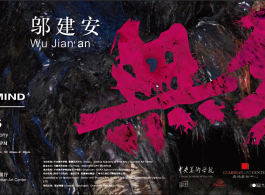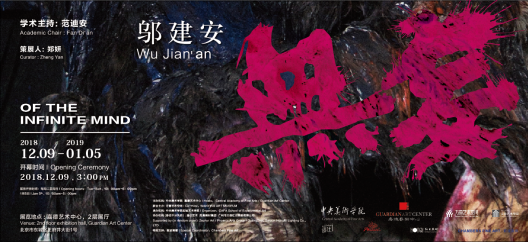Of the Infinite Mind
Guardian Art Center, Beijing
Exhibition Date: December 9, 2018 – January 5, 2019
Opening Reception: Sunday, December 9, 3:00 pm
Venue: Guardian Art Center, No. 1 Wangfujing Street, 2 FL, Beijing, China
Of the Infinite Mind, the latest solo exhibition of artist Wu Jian’an, will open on December 9th, 2018 at Guardian Art Center, Beijing. This exhibition is jointly organized by the Central Academy of Fine Arts (CAFA) and Guardian Art Center, co-organized by Wanying Art Museum, Academically chaired by Fan Di’an, and curated by Zheng Yan.
Wu Jian’an was born in Beijing in 1980. He graduated from the Central Academy of Fine Arts in 2005 and is currently an associate professor of CAFA’s School of Experimental Art. His works have been exhibited at the Metropolitan Museum of Art in New York, Museum of Fine Arts in Boston, 4th Fukuoka Asian Art Triennale, the John F. Kennedy Center for the Performing Arts in Washington DC, Central Academy of Fine Arts Art Museum in Beijing, Shanghai 21st Century Minsheng Art Museum, Prince Kung’s Palace Museum, and Beijing Minsheng Contemporary Art Museum. Wu was one of the artists featured at the 57thVenice Biennale China Pavilion in 2017 and was selected to participate in the 2018 Echigo-Tsumari Art Triennale with his 500 Brushstrokes series.
Of the Infinite Mind is the first major exhibition co-organized by the Central Academy of Fine Arts and Guardian Art Center, and also the first solo exhibition of a contemporary artist at Guardian Art Center. Divided into various sections at this new cultural landmark in Beijing, the exhibition features over 100 recent works of seven series to showcase the artist’s idiosyncratic development both in art concepts and visual creations.
The title Of the Infinite Mind (“Wu Wang”) originates in Zhu Xi’s The Texts and Annotations of the Four Books. In the context of Chinese culture, Wu Wang is not only a synonym of truth but also refers to a state of mind that follows the dictates of the heart and breaks free from delusion. The brass sculptures Daydream Forest that evolved from a series of black and white paper-cuts and collages on Xuan paper inspired by the SARS epidemic in 2003, reveals the individual’s empathetic responses to a crisis in the real world. In Shadows of Knives – Plain Faces, the artist used different kinds of sharp weapons to stab, slice and puncture the soaked buffalo hide to represent the subconscious desire for violence and destruction. Wu has always focused on using a strong visual style to anatomize the spirit world in a direct and truthful way. On one hand, he makes the creations and experiments of visual art meaningful in the psychological and sociological domain; on the other hand, he imparts a feeling of pure unity and astonishing power in his works.
In addition, the word Wu Wang also represents unexpectedness. The English title “Of the Infinite Mind” expresses this meaning better. Infinite means not clearly-defined, not limited by time or boundaries, like a kind of shapeless existence. In his newly created Rare Treasure and 500 Brushstrokes, Wu managed to present the “infinite” in multiple aspects of his work including concepts, medium, and language. In Rare Treasure, the artist continued to use animal components, added a layer of storytelling beyond figuration and abstraction by transforming materials and rearranging space, creating a mythological scene. In 500 Brushstrokes, he used watercolor and paper-cut to create collages from vast quantities and styles of brush strokes, turning the two-dimensional image into a kind of space-time in which different people meet each other through their brush strokes. In the words of Wu Hung, the distinguished art historian, critic, curator and professor at the University of Chicago, “Individual and unity, ancient and modern, tradition and future, figuration and abstraction, two and three dimensions, words and images……Wu Jian’an’s imagination naturally merges, rather than fighting against or criticizing these concepts. In other words, he can link opposite concepts.”
For the viewers, unexpectedness creates dual stimulations from the intellectual and sensory dimensions. But for the artist, crossing boundaries, integrating, transgressing and disarranging are not only the methods of creating something unexpected but also inevitable in art practice. “Creating is often accompanied by expectation and fear because you are not sure if you can make it, or even what the result will look like. However, the lack of control in the outcome is the most magical part of the art,” Wu Jian’an said.
In the exhibition Of the Infinite Mind, curator Zheng Yan makes full use of the spatial characteristics of the second-floor exhibition hall at Guardian Center Beijing, to build a new visual arena from the various textures, scales, and styles of Wu Jian’an’s works. On one hand, it highlights the experimental tension of the works. On the other hand, it provides the audience with an unusual aesthetic and spiritual experience. Compared with the solo exhibition Omens at Minsheng Art Museum Beijing two years ago, Of the Infinite Mind is not only a response to Omens but also a continuation. Omens and Of the Infinite Mind are like two sides of a coin, one inadvertently disclosing the designs of the Gods, while the other arrives without reason. Ancient myths, legends, prophecies, figures… all of these can be interpreted in these two ways in the descriptive system created by Wu Jian’an in the form of contemporary art. Of the Infinite Mind, in fact, is an artistic discovery and spiritual journey close to Tao.




